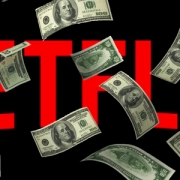Netflix cost us ALL a lot of money during lockdown!
So we all spent a ridiculous amount of money on Netflix during lockdown. According to research by USwitch Our Netflix binges cost over £2BN in global energy usage. The exact number spent on electricity to power Netflix is £2,120,503,521.30. That’s ALOT of money. The data uses global costs per KWh and average energy consumption to calculate the cost of 2 hours of watching per day. The UK has the second highest cost for a country at £245,873,114.79, behind the USA at £788,546,852.28.
Furthermore it has been discovered that it costs on average £22.20 per person to watch Netflix in the UK per year. However, lockdown may have increased the time we spend watching. This is the 10th highest cost per person in the world! While, Orange Is The New Black is the most expensive show to watch by energy usage, with the UK spending £121,302,434.51 in total to watch all 7 seasons
Netflix Consumption Costs Per Country:
Energy costs per KWh and subscriber numbers differ between countries; the table below shows the top 10 countries by total Netflix cost:
| Country | # of Subscribers | Annual Cost (Country) | |
| 1 | United States | 60,103,000 | £788,546,852.28 |
| 2 | United Kingdom | 11,073,894 | £245,873,114.79 |
| 3 | Germany | 5,774,730 | £192,324,062.18 |
| 4 | Brazil | 9,624,550 | £126,273,374.16 |
| 5 | Spain | 4,529,200 | £109,703,564.88 |
| 6 | France | 5,661,500 | £108,560,819.41 |
| 7 | Japan | 3,707,463 | £82,316,615.62 |
| 8 | Canada | 7,133,490 | £79,192,260.90 |
| 9 | Netherlands | 3,328,962 | £60,474,090.14 |
| 10 | New Zealand | 2,264,600 | £45,709,818.70 |
Cost Per Subscribers
The cost per person is dictated by the cost per KWh of electricity in the country and the total number of Netflix subscribers.
The table below shows the top 10 countries by per-person cost:
| Country | # of Subscribers | Annual Cost (Per Person) | |
| 1 | Denmark | 927,354 | £34.31 |
| 2 | Germany | 5,774,730 | £33.30 |
| 3 | Belgium | 894,731 | £28.26 |
| 4 | Italy | 1,585,220 | £27.25 |
| 5 | Ireland | 283,075 | £26.24 |
| 6 | Portugal | 248,010 | £26.24 |
| 7 | Spain | 4,529,200 | £24.22 |
| 8 | Austria | 645,411 | £23.21 |
| 9 | United Kingdom | 11,073,894 | £22.20 |
| 10 | Japan | 3,707,463 | £22.20 |
Netflix Cost Per Shows
Based on the cost per KWh in each country, the number of viewers of each show** and the length of five of the most watched shows of 2019 in hours, we can see how much each country spent watching each show:
| Country | Orange is the New Black | You | Umbrella Academy | Dead To Me | Stranger Things |
| United States | £389,032,582.88 | £25,397,617.34 | £16,823,529.36 | £6,007,671.06 | £23,618,963.97 |
| United Kingdom | £121,302,434.51 | £7,919,112.56 | £5,245,666.19 | £1,873,223.88 | £7,364,518.95 |
| Germany | £94,883,806.14 | £6,194,397.86 | £4,103,205.15 | £1,465,251.81 | £5,760,589.98 |
| Brazil | £62,297,448.47 | £4,067,028.90 | £2,694,023.58 | £962,034.02 | £3,782,205.54 |
| Spain | £54,122,670.17 | £3,533,346.38 | £2,340,509.18 | £835,794.26 | £3,285,898.03 |
| France | £53,558,892.35 | £3,496,540.68 | £2,316,128.87 | £827,088.07 | £3,251,669.92 |
| Japan | £40,611,214.79 | £2,651,264.03 | £1,756,212.70 | £627,142.38 | £2,465,589.93 |
| Canada | £39,069,802.53 | £2,550,634.41 | £1,689,555.06 | £603,338.98 | £2,372,007.64 |
| Netherlands | £29,835,121.93 | £1,947,757.19 | £1,290,205.68 | £460,731.58 | £1,811,351.29 |
| New Zealand | £22,551,112.57 | £1,472,227.66 | £975,212.16 | £348,247.61 | £1,369,124.18 |
| Italy | £21,310,801.38 | £1,391,255.14 | £921,575.49 | £329,093.99 | £1,293,822.35 |
| Poland | £17,874,071.97 | £1,166,891.57 | £772,955.76 | £276,021.98 | £1,085,171.48 |
| Sweden | £16,664,414.30 | £1,087,920.23 | £720,644.69 | £257,341.73 | £1,011,730.68 |
| Denmark | £15,698,962.09 | £1,024,891.61 | £678,894.16 | £242,432.65 | £953,116.10 |
| Belgium | £12,473,748.70 | £814,336.67 | £539,421.34 | £192,627.00 | £757,306.80 |
| Switzerland | £8,637,078.11 | £563,863.32 | £373,506.34 | £133,378.86 | £524,374.68 |
| Finland | £8,083,292.75 | £527,709.98 | £349,558.16 | £124,826.98 | £490,753.24 |
| Austria | £7,391,127.14 | £482,522.61 | £319,625.78 | £114,138.15 | £448,730.45 |
| India | £7,216,356.02 | £471,112.85 | £312,067.89 | £111,439.23 | £438,119.74 |
| Colombia | £6,515,020.01 | £425,326.80 | £281,738.95 | £100,608.79 | £395,540.19 |
| Ireland | £3,664,555.79 | £239,236.99 | £158,471.98 | £56,590.24 | £222,482.68 |
| Portugal | £3,210,620.80 | £209,602.29 | £138,841.77 | £49,580.30 | £194,923.36 |
| Peru | £2,697,115.45 | £176,078.58 | £116,635.48 | £41,650.45 | £163,747.40 |
| Chile | £2,577,028.74 | £168,238.84 | £111,442.38 | £39,796.00 | £156,456.69 |
| Turkey | £1,982,436.08 | £129,421.43 | £85,729.51 | £30,613.95 | £120,357.75 |
| Romania | £970,888.83 | £63,383.54 | £41,985.63 | £14,993.04 | £58,944.65 |
| South Africa | £774,229.80 | £50,544.85 | £33,481.20 | £11,956.11 | £47,005.08 |
| Greece | £699,477.34 | £45,664.70 | £30,248.57 | £10,801.74 | £42,466.70 |
| Argentina | £452,150.01 | £29,518.18 | £19,553.01 | £6,982.37 | £27,450.95 |
Research
Speaking of the research, Sarah Broomfield, energy expert at Uswitch said:
“Lockdown has almost certainly impacted global spend on home energy and people will be thinking more about how the small things they do to use electricity in their home contributes to the bigger picture when it comes to their annual bills.
“Noting that energy costs are so different around the world, we wanted to explore the relative cost of common activities to understand how those differences impact us on a practical level.
“We encourage home energy users to regularly review their energy bills to identify any savings and to compare energy prices annually to ensure they’re getting the best deal possible.”
—
Methodology:
The global cost of Netflix electricity was calculated by energy market analysts at Uswitch, the comparison and switching service.
The global cost per KWh was taken from the World Energy Council; this was then applied to the energy use requirements of common household items as defined by the Centre of Sustainable Energy.
The cost of powering a television was then applied to the average Netflix consumption of 2 hours per day, which gave a cost per person based on the country’s cost of electricity. This was then multiplied by subscriber numbers per country, as sourced from Netflix, to calculate the total cost per country per year.
Uswitch’s World Powers report is a study of the global cost of energy applied to common household activities to provide a clearer picture of the relative impact of energy cost differences around the world; the full study can be found at https://www.uswitch.com/gas-electricity/world-powers/.
The research from Uswitch comprises data relating to a range of common household activities including charging a laptop, boiling a kettle and topping up an electric vehicle. The full study can be found at https://www.uswitch.com/gas-electricity/world-powers/.
**Netflix doesn’t publish country-specific viewer figures, so USwitch took global viewer figures and multiplied them by the percentage of total subscribers in that country to calculate the number of viewers per country.
—
So, keep up to date with everything How To Kill An Hour by signing up to our newsletter by clicking here!
Also, let us know what you think of the show by clicking here!
Furthermore, Click here to subscribe to our YouTube Channel to see more amazing ways to kill time!
While you are there, follow us on Twitch by clicking here!


